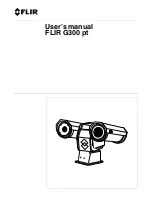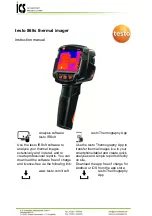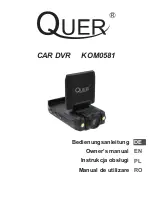
Copyright 2010 International Safety Instruments, Inc.
7
level decreases to where the yellow LED turns off and
only the red LED is lit, the operator must immediately
leave the hazardous environment.
CAUTION:
Due to the unknown hazardous
conditions of the environment and the environments
effect on the battery, the 15 minutes are NOT
guaranteed.
3.7 Sensor Temperature Warning
3.7.1 Should the internal temperature of the camera
begin to reach its operating limit, all four LED begin to
blink. Operator must immediately leave the hazardous
environment when warning appears.
CAUTION:
Due to the numerous environmental
variations between fire scenes, there is no way to
predict the amount of time before sensor shutdown
after the warning appears on screen.
3.8 Battery Charging
3.8.1 Internal Battery Charger
3.8.1.1 To set up the internal charger, connect
the power cord to the charger block. Plug the
charger block into the charger base. Plug the
power cord into a wall 110 outlet. The red LED
will come on if properly connected.
3.8.1.2 To connect the internal battery charger,
turn the camera over and place the optical lens
facing you. Take the battery connector cord
and line up the red dot on the cord connector
with the flat section of the second ring of the
camera connector (see picture). Push the cord
connector into the camera connector until
secure. Check the charger LED to determine
proper connection and battery/charger status.
NOTE:
Do not fold or drastically bend
connector cable.
3.8.1.3 To remove or unplug internal charger,
grab the connector by the ribs and pull straight
out.
WARNING: Pulling cord or non-ribbed
section of connector will damage the
charger and rend it useless.
CAUTION:
Do not leave the charger
plugged into the camera without power. Do not
use power supplies other than those provided.
3.8.2 External Battery Charger
3.8.2.1 To set up the external charger, connect
the power cord into the charger block. Plug
the charger block into the charger base. Plug
the power cord into a wall 110 outlet. The
red, yellow and green LEDs will illuminate in
sequence, twice.
3.8.2.2 To install battery, line up the rails of the
battery with the tracks on the charger base and
slide it into place. Check for proper seating of
the battery by ensuring the forks of the release
button on the battery are not visible. If forks are
visible, push battery in until forks disappear.
NOTE:
Both the internal and external chargers
come with 12 V DC charging plugs. Simply
replace the power cord and charger block with
the 12 V DC charging plug and follow the steps
in 3.8.1.1 and 3.8.2.1.
3.8.3 External Battery Charger Status
3.8.3.1 When the battery is slipped on, the red,
LED will light-up.
3.8.3.2 Depending on the starting voltage in
the battery, the battery charge time will be two
to three hours. The first green LED will begin to
blink when the battery is fully charged.
3.8.3.3 The fully charged battery may be
left on the charger indefinitely. The charger
automatically switches to maintenance mode
when the battery reaches full charge status.
3.8.4 Internal & External Charge Status
3.8.4.1 The following diagrams directly
correspond to the labels on the charger
bases. Please familiarize all operators with the
following indicators:
External Charger Label
flat section
!
!
!
!
!





























